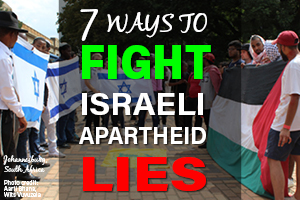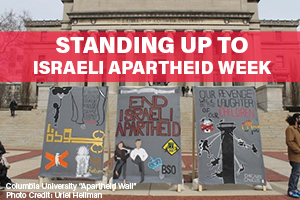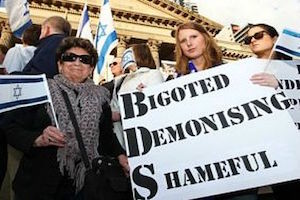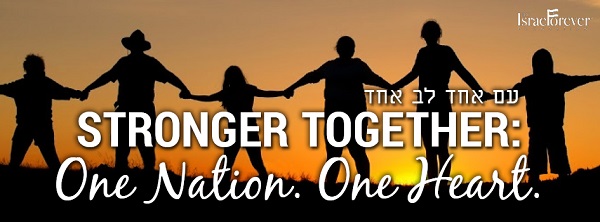The Toxic Impact of BDS
As an educator and historian actively involved in Jewish community engagement with Israel, I have watched the BDS movement grow, taking over the dialogue surrounding the Arab Israeli conflict.
From local events to headlines, on campuses, in the workplace, in local communities and on every single social media platform, the Boycott Divestment and Sanctions movement is garnering increased support as a way to voice opposition to Israel.
Journalists, especially Jewish journalists, face a unique challenge in trying to represent the “facts” surrounding BDS, with the Jewish support for the movement adding increased complexity to how one understands this growing trend in the Jewish world to join forces with those that are, in no uncertain terms, enemies of Israel.
The rise of BDS in Jewish congregations, community councils, organizations, schools and, yes, in some Jewish homes demonstrates the perceived influence of this approach as a way of contending with, or combating, aspects of Israel’s reality that Diaspora Jews find unappealing or unacceptable. In their desire to counter policy or social inadequacies, BDS seems to offer a viable method through which change can be made.
However, BDS is not concerned with morals, values or peace. As its own leaders have emphasized, their global initiative is less focused on human rights than on the delegitimation, demonization and destruction of Israel. Propaganda, lies and smear campaigns do little to address actual problems that deserve attention and action. Instead, the BDS version of activism serves only to increase the negative image of Israel and Jews in the eyes of the world while creating very few practical achievements for the cause of human rights it claims to protect.
This is not a new tactic by any means. Throughout history, boycotts have been used to sway public opinion, maintain control over local Jewish populations, thus decreasing the “Jewish influence” in politics, economy and community relations. With Jews heavily involved in trade and production, from medieval times through the Nazi reign of power, boycott of Jewish goods was a tool for creating division between factions of society while successfully altering the acceptance of Jews as accepted members of said society.
The Jew was the parasite of the world, and those who supported them financially through purchasing their goods were aiding and abetting the threat that the Jews imposed on the civilizations in which they lived.

Whether locals were banned from the Jewish marketplaces, or increased taxes imposed on those who purchased from Jewish vendors, or when buying from Jews became a criminal offense, the message nearly always included a manifestation of the Jew as perverted, animalistic, dangerous. The logic, the emotion, and the use of visual imagery enabled the trend to spread throughout whole societies until even assimilated Jews aligned themselves against their brethren nation for the sake of social acceptance. They, too, joined the movements fighting these “too Jewish” influences.
Economics nearly always accompanied the revival of Jew hatred, whatever form, whatever name, whatever generation. The BDS movement of today is no different. And Israel is that Jewish “devil” with the same labels placed upon it, struggling to exist in a world ready to believe anything that vilifies her.
Modern claims against Israel, however, differ significantly in that Israel has legal recourse through which to defend herself. And a military to act on her behalf. However, the BDS supporters are instigated further in their efforts because of this. When Israel was small, weak and indefensible - either as a nation scattered across the world, or as a fledgling nation-state in the early days of our return to our ancestral homeland - a global demonization campaign may not have been as effective. But in an age of social media when most people read headlines or memes and are aroused by the pornography of Pallywood, BDS has become one of the most dangerous social streams since Nazism.
Now, as then, the accusations distort historical fact, twist individual instances into stereotyped generalizations, and purport a logical, rational explanation behind their dogma of unreasoned hate.
As Hitler himself wrote in 1919, “Emotional Antisemitism will find its final expression in the form of pogroms. Rational anti-Semitism, by contrast, will lead to a systematic and legal struggle against, and eradication of, the privileges Jews enjoy.” Living as a foreign minority in the Diaspora, these ‘privileges’ included economic, social and political freedoms that enabled, as Hitler claimed, “ethnic infiltration, overwhelming occupation of whole societies, and a siege on humanity.”
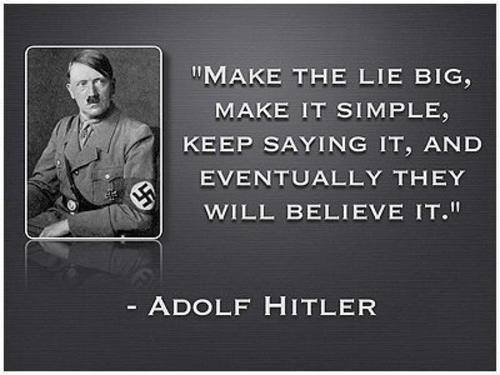
In today’s BDS rhetoric, the whole of Israel is guilty of “ethnic cleansing, occupation and a siege on society.” The echoed sentiments are but one example of the real face behind this movement, just as it was for the Nazi supporters: to dehumanize and destroy. Even the founders and most prominent BDS advocates have reiterated Hitler’s final objective time and time again: “the total removal of all Jews from our midst. One state, one nation. Palestine.” Consequently, even those who believe themselves to be a part of a meaningful movement for social justice are party to this mission.
The fervor with which the growing body of BDS activists have progressed their cause over the last decade is the result of this combining of emotion and reason towards a common enemy: Israel, Zion, Jews. Anyone who looks solely at BDS as a means without considering its desired end is choosing to remain ignorant as to its dangers. In the BDS agenda, there is no room for the survival of any Jew, Jewish State, Jewish nationalism, Jewish history, Jewish memory. Sound familiar?
Legitimate criticism is a welcome and necessary part of any sustainable society. Israelis more than anyone know the value of excited debate and cherish the opportunity to hash out the challenges of Israel’s unique realities. Yet Anti-Zionists and BDS activists, just like Antisemites, focus on a select few crimes to advance their success in increasing their following and public influence.
The “occupation” of land (even though won through war), settlements built on “stolen” land (denying the indigenous connection of Jews to the land and even though original ownership cannot be proven), social inequalities representing the extreme and not the mainstream, and attempted genocide by the killing of innocents. Each of these possess an emotional upheaval in favor of the victim - in this case, solely the Palestinian.
What BDS ignores is that the Arab-Israeli conflict is complex, nuanced, and has many angles from which to approach it. BDS immorally imposes the entire blame for the continuing Israeli occupation and settlement policy on the Israelis. Minimizing, simplifying them into one narrative dominated by Palestinian “victimhood” shows that BDS has no interest in pursuing understanding or meaningful compromises, no matter a lasting peace. And because they share a single mission, they are incredibly successful in garnering others to support their cause - including our own Jewish people. All the while knowing that the taglines and rallies are but a mask for their ultimate goal.

Historically, those same acts have been crimes against the Jewish nation. We have had our ancestral land occupied from the First Exile and onward, countless peoples have built their settlements there, to say the least about one murderous regime after another that sought to wipe us off the face of the earth. And yet the Jewish response has always been to just. keep. living. And building, and doing, and thriving and celebrating and laughing. That’s what we do best, no?
Anyone who knows an Israeli knows that we do not take lightly to be considered victims. We, the generation of Jews who live out the legacy of the pioneers before us, will not stand idly by as our pride, our dignity, our humanity are defamed. Fighting BDS is no different than fighting any other enemy of Jewish existence.
Not every anti-Zionist may be an Antisemite; but there is not a single claim or tactic of BDS that does not incorporate some strain of the venomous hatred for Jews that is integral to its success. And time and again, public forum debates have proven that what begins as a criticism of a political or military policy is quickly reduced to a derogatory remark against Jews as a people, faith or nation. This makes Jewish support of anti-Israel movements an increased challenge that we must face head on.
Unfortunately, the catch phrases and rationales employed by BDS are persuasive, for those who “merely” see Israel’s faults as inexcusable as much as those who believe Israel is the world’s most dangerous nation. The use of references to the “brutal Israeli occupation army” leave no room for debate. They shut down any other representation of facts about Israel, no matter how accurate or backed up with evidence.
No amount of eye witness accounts or documentation effectively deters the BDS methods of pressure, because it is too easy to cast away unwanted facts and continue to scream the keywords of “Justice and Freedom! End Israeli Apartheid!” Or to spread lies about fabricated numbers of Palestinian children kidnapped and murdered every day by Israel that get plastered on billboards in major city centers.
Similarly, no amount of explanation may ever wholly enable “outsiders” to understand the situations in which undesired mistakes or destruction may have occurred. An examination of the facts would, time and again, demonstrate that nearly every action is a reaction to a threat, an attack, a war imposed on us by others. When rational explanations for actions and events are excluded, all that is left is propaganda.
BDS activists and its supporters are not actually interested in truth. They are only interested in reducing Israel to nothing more than being the parasite of the world. As today’s generation is blinded by the keywords and headlines, and Israel becomes the irrational, expansionist, brutal nation of extreme pro-Palestinian propaganda, simply by leaving out the factual details.
If BDS had any real concern for the lives and livelihood of Palestinians, they would recognize that Israel has been and continues to be the largest investor in advancing their economy, education and infrastructure. If the BDS movement truly wanted to make a difference, they would join the fight against terror that diminishes any hope of successful peace or reconciliation between the nations.

If the BDS movement was based on honesty and integrity, they would promote balanced education among Palestinians many of whom are brainwashed to hate Jews from birth. They would ensure that their activists spread truth and seek productive solutions rather than disseminate lies, die-ins and warped numbers of those killed in the conflict. If they truly believed in boycotting “criminal regimes,” they would target the dozens of countries where hundreds of thousands have been massacred. But they do not. They are not. And it makes it even more dangerous for us to underestimate the significance of this movement.
As we see, the continued rise of the BDS international delegitimization initiative is an echo of the past. Too many are “afraid” of drawing comparisons out of fear of diminishing the Holocaust in some way. On the contrary. We MUST examine parallels throughout history that begin as small grassroots efforts and that grow organically because of the excitement and meaningfulness that they arouse so that we can discover new ways to combat them. What we must ask ourselves is, What would we have wanted our fellow Jews to do then in the face of economic sanctions and social boycotts against a whole nation?

Forget what we know about the Holocaust. Put yourself in the shoes of Jews in the Bialystok marketplace in 1363, of Vilnius in 1522, of Germany in 1926 who could not fathom what would come next. Gas chambers had yet been conceived. Had the power of the message and the rising hate not been ignored, perhaps the boycotts of 1931 and 1933 could have been avoided. Or perhaps not. For as they say, in every generation…
BDS is today what Nazism was in its first decade, and while we have yet to discover the antidote, we must not cease our efforts to defeat them. Beyond boycotts and sanctions, BDS legitimizes even terrorism as a response to Israeli defensive action. Yet even today, when incitement against Israel is repeated across every possible news outlet and social media platform, the danger is being ignored by the masses - even those who rally behind the words “Never Again.”
BDS succeeds in spreading lies and hate by using Jew-baiting as a tool. While some of its efforts at cultural, academic and goods boycotts are failing, we cannot minimize the ongoing impact of its message on persuading public opinion about the Jewish state. Every venue, every genre is an open platform for the BDS propaganda that is infiltrating nearly every society, and the most significant measure of its success is the involvement of Jews in their movement. Just as before in history, when they divide us, there is greater likelihood of success.
Israelis, however, aren’t swayed by the boycotts. BDS does not change our personal opinions on the situation in Israel because we are too busy living within it, hoping for an end to the endless terror, and for the world to recognize our human rights. It does not influence our perspectives, just as it is not an effective means of fostering policy change. If you want to make change, live here, fight the system, do something that makes an equivocal difference rather than joining our enemies in their campaign to destroy us.
What does sway us is the toxic impact of BDS on Diaspora Jews. It impacts our relationships with family and friends, our livelihoods, our hopes for the future. Fewer tourists, even fewer Jews, are coming to see for themselves the baselessness of many of the BDS accusations. Anyone who comes here sees first hand that there is nothing even resembling apartheid. It is through our own eyes that we see the good, the bad, the sweet and the sour, and know that we cannot take any claim at face value without recognizing the likelihood of a distortion embedded somewhere within.
In every generation, there has been something, many things, that have divided our nation - differing opinions, ideologies, religious practice, assimilation trends. Few have been as dangerous as what is taking root today where our connection to our ancestral homeland is being threatened every day.
ONLY if we as Jews do band together, use shared language and a basic level of understanding of history, the facts and the relevance of Israel to Jewish life and identity will we overcome BDS as this generation's most serious challenge. ONLY if we protect our historical legacy to Judea and Samaria, we will remain connected whether or not a Palestinian state is created there. Only then will we be able to recognize distinctions between those who sincerely want to create a better reality from those who want to alter and destroy all that the Jewish nation has achieved in our years of building Eretz Yisrael.
As we all love to share our opinions, engage in debate, and seek out realistic solutions, our collective hope must be that the Diaspora voice can play a role in fostering the positive change in Israel that we all want to see in our desire for an exemplary society, yet in a proactive yet collaborative way. BDS does not achieve that. And we must unite against this rising trend that threatens all of Israel so that we can truly fight incitement, propaganda and demonization, and facilitate a fair debate for the sake of Israel and our Jewish People.
DISCUSSION QUESTIONS:
- What is the mission of BDS?
- Can the BDS boycotts and the Nazi boycotts be compared? Why?
- Why do you think so many people, including Jews, support and promote BDS claims? What makes BDS so convincing?
- What are some ways to fight against the claims or activities of BDS?
Recommended for you:
About the Author



